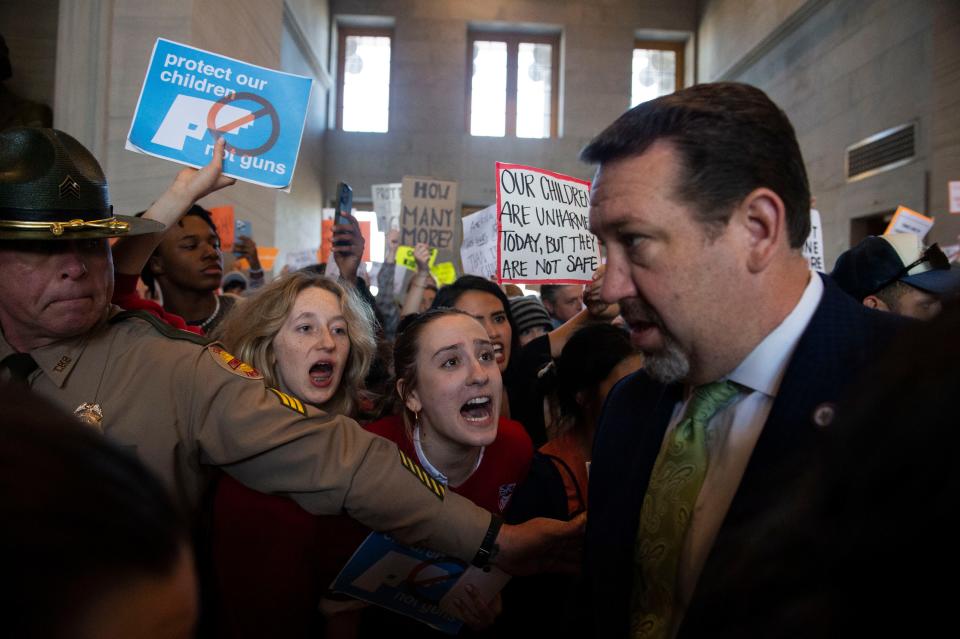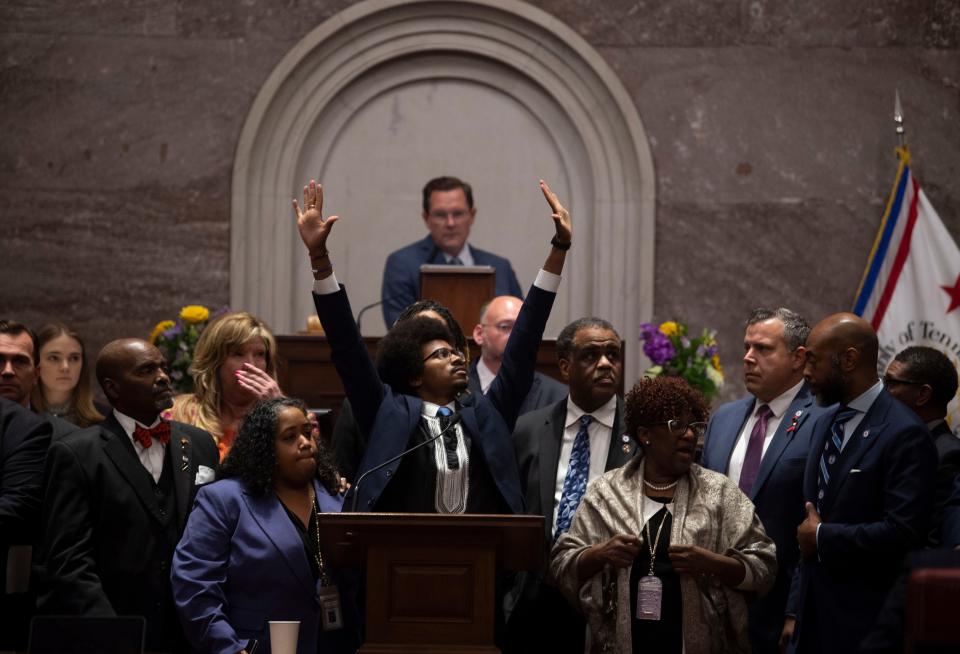The week in politics: House GOP meet behind closed doors amid Tennessee voucher debate
- Oops!Something went wrong.Please try again later.
House Republicans on Wednesday held a closed-door caucus meeting to discuss their upcoming education bill, which is poised to differ significantly from Gov. Bill Lee's school choice proposal carried in the Senate.
The House majority in 2020 moved to largely close its caucus meetings, a break from years of tradition to hold them openly. Senate Republicans provide notice of their caucus meetings, which are open to media.
Closed caucus meetings used to be so rare The Tennessean in 2016 reported on one meeting when media was asked to leave. During caucus elections four years later, Republicans voted to close future meetings to the press.
At the time, House GOP Caucus Chair Jeremy Faison, R-Cosby, said the closed meetings allow the caucus to take care of "family business" in a private setting and vowed not to vote on "official" business.
But the closed-door meetings allow Republicans, who wield supermajority power, to deliberate privately as a group on legislation the public may not yet be privy to.
The House GOP has yet to file their amendment to the Education Freedom Scholarships bill, which already has two dueling versions filed in the Senate. But House Majority Leader William Lamberth, R-Portland, has described it as a sweeping "omnibus" bill, signaling its parameters will be much wider than Lee's proposal.
House leaders promised the bill would make its first showing in the coming days. Lamberth said it will include the school choice aspect, in addition to public school reforms.
"It's all encompassing to improve education in our state, and you can't you can't just improve it by choice. I think we've said that many times," House Speaker Cameron Sexton, R-Crossville, said. "Choice is one aspect of it, but we're still going to have 95% of our students in public school."
Lawmakers would only refer to it in vague terms, but leadership signaled they also hope to roll back some public education requirements in the state.
"There's a lot of things in there that I think the state's overdoing that we need to pull back on that would free up the classroom time and provide more freedom and autonomy to the school districts," Sexton said.
Legislative Democrats continue to criticize Lee's proposal for its lack of accountability measures, among other aspects.
House Democratic Caucus Chair John Ray Clemmons, D-Nashville, criticized the House GOP omnibus effort as an attempt to insulate a controversial voucher program with public education reforms that might be more palatable in some members' districts. Clemmons said Democrats think teachers should "have better insurance, we think they should have higher pay, we want to strengthen our public schools.
"My question is, why aren't we passing all of that stuff anyway?" Clemmons said.
Clemmons called for a straightforward vote on Lee's voucher proposal.
"You have to recognize that they're trying to use all those things not to benefit our public schools or to benefit teachers, but they're trying to buy votes. They're throwing everything they can to try to get enough votes to try to pass the voucher scam," Clemmons said.
Faison opposed to IVF limitation
Faison said Thursday a recent Alabama Supreme Court ruling that legally identified frozen embryos as children made him "nervous," as its legal implications have led multiple Alabama in-vitro fertilization clinics to pause all treatments.

Reproductive health advocates say the ruling could throw IVF access across the country into disarray and have long raised the alarm that strident anti-abortion advocates planned to target reproductive health issues such as IVF and birth control access in the coming years.
Sexton declined to comment on the ruling, but Faison said the ruling made him "nervous," as he has family and friends who have used IVF to grow their families.
"To me, that's very pro life to use in vitro fertilization," Faison said. "Those conversations came up here in Tennessee, and they didn't advance here. So, that's where I'm at. I just want to make sure that we're pro-life all the way, and I don't know how pro life that was."
With Trump in town, Lee sidesteps presidential endorsement
With days to go before Super Tuesday on March 5, Lee again declined to make an endorsement in the Republican presidential primary, hours before GOP frontrunner former President Donald Trump was set to speak in Nashville.
Lee, who serves as chair of the Republican Governors Association, said that he is instead focused on supporting Republicans in gubernatorial elections across the country. Almost every member of Tennessee’s congressional delegation has endorsed Trump and is actively backing his campaign.

Following the Alabama Supreme Court’s ruling this week that frozen embryos created in IVF treatments can be considered children under that state’s law, Lee said he is generally “supportive of IVF,” but declined to weigh in on on whether Tennessee might go down a similar path, saying that he is not familiar with “the details of that case and ruling.”
Tennessee has one of the most restrictive abortion bans in the country, with only limited exceptions to save the life of the mother.
Lee made the comments at a POLITICO governor’s forum in Washington D.C., in conversation with POLITICO’s Natalie Allison, who previously covered state politics for The Tennessean. Also at the forum were New York Gov. Kathy Hochul, Georgia Gov. Brian Kemp, and New Hampshire Gov. Chris Sununu.
A new bathroom bill passes committee
Lawmakers gave first approval to a bill that seeks to criminalize transgender individuals’ use of single-sex designated restrooms, locker rooms, and showers by expanding the criminal offense of “observation without consent” easily passed its first committee Tuesday.
Sponsored by Rep. John Ragan, R-Oak Ridge, the measure would apply to businesses and entities that allow transgender individuals to use sex-designated multi-person facilities, and would create a basis for lawsuits against such entities.
“The fact is that males are granted access to women's and girls’ private spaces. There have been numerous reported instances as early as middle school that, at best, destroys the environment of safety and comfort and at worst, ends up in life-altering rape,” Ragan told members of the House Criminal Justice Subcommittee on Tuesday. “ The desire to accommodate transgender individuals cannot come at the price of our young women's safety.”

In testimony opposing the bill, Jace Wilder, speaking on behalf of Transgender Tennessee and the Tennessee Equality Project, told members of the committee the bill would “create an environment of fear” for transgender Tennesseans.
“We as a state need to do better, we can start by not criminalizing both Tennesseans and companies from inclusivity,” they said. “This state is our state, too.”
Permanent expulsion?
A Constitutional amendment to permanently bar expelled members of the legislature from reelection or reappointment by their local governing bodies began moving through the legislature. Members of the House Public Service Subcommittee approved the measure by voice vote on Tuesday.
If approved by voters and added to the state Constitution, the permanent expulsion policy would apply to members expelled on or after Jan. 1, 2027.
An amendment must pass the legislation this year, and again during the 114th General Assembly before going before voters in the 2026 gubernatorial election.

Bill limiting candidates to one office passes Senate
A measure that would prevent candidates from running for two offices at the same time squeaked through a floor vote with the minimum votes needed to pass in the Senate on Thursday morning.
Senate Bill 1968 passed with bipartisan opposition on a 17-15 vote with Republican Sens. Janice Bowling, Rusty Crowe, Joey Hensley, Jon Lundberg, Frank Niceley, Paul Rose, Steve Sutherland, Brent Taylor, and Page Walley all joining Democrats in opposing the measure. Sen. Todd Gardenhire, R-Chattanooga, voted present, not voting.
Sponsored by Sen. Richard Briggs, R-Knoxville, leadership has said the bill is not aimed at any one person in particular. However, critics have widely said that the bill is targeted at Rep. Gloria Johnson, D-Knoxville, who is running simultaneously both to keep her seat in the Tennessee House of Representatives and win the Democratic nomination to challenge U.S. Sen Marsha Blackburn for her seat.
The bill is set to be taken up in the House Local Government Committee next week.
Republicans block bill to allow abortions for child rape victims
House Republicans blocked an effort by Johnson to establish abortion exceptions for pregnant children aged 12 and under. The legislation was tailored to apply to children under the age of sexual consent, meaning all girls eligible for the procedure had become pregnant as a result of rape.
Johnson's bill failed in the Population Health Subcommittee on a party-line vote.
"These kids are not physically or mentally ready for childbearing or parenthood. This could affect their future ability to have wanted pregnancies," Johnson said, noting children who are pregnant die at two times the rate of pregnant adults.
Republicans objected to Johnson's bill because it would allow a pregnant child to terminate the pregnancy for any reason, not just a medical emergency, and the bill did not include restrictions on what stage in the pregnancy it could terminated.
"It's a health problem, it's a concern, for a 10-year-old to carry a pregnancy, period," Johnson said.
Rep. Sabi Kumar, R-Springfield, said the legislation "leaves the door open to something that is morally repugnant," referring to abortions performed later in pregnancy.
TBI sexual assault kit processing times down
The evidence processing turnaround time for sexual assault kits at the Tennessee Bureau of Investigation is now around 15 weeks, down from 44 weeks in late 2022.
Processing for the evidence kits came sharply into the spotlight after the 2022 kidnapping and murder of Memphis mother Eliza Fletcher while she was out on a run. The man charged with Fletcher’s killing had also been charged with a 2021 sexual assault, but a nearly year-long delay in evidence processing delayed his arrest in that case until after Fletcher’s murder.
During the TBI’s budget hearing this week, Director David Rausch said the agency is now routinely able to process such evidence in 15 weeks. With the addition of a handful of new forensic scientists currently finishing their training, Rausch expects the agency will reduce processing times to the goal eight to 12 weeks by later this spring.
“We feel confident that we are getting to the point that we said we were going to get to all along,” Rausch said. “As soon as these scientists are trained up, we’ll be able to get back in balance.”
Lee signs bill allowing officiants to decline to perform marriages
Lee quietly signed into law a bill allowing officiants to decline to solemnize marriages for any reason, which has been criticized by the LGBTQ community as antagonistic.
The law does not block anyone from obtaining a Tennessee marriage license.
Molly Whitehorn, associate director of regional campaigns for the Human Rights Campaign, called the measure “the latest example of overreach” by the legislature.
“Let’s be clear- this bill is intended to exclude LGBTQ+ folks from equal protection under the law,” Whitehorn said in a statement. “All Tennesseans have a right to marry the person they love regardless of gender and should not be turned away by a government employee based upon that employee's personal beliefs.”
"The Governor deferred to the General Assembly on the final amended bill," Lee spokesperson Elizabeth Johnson said.
Catch up on the week
Tennessee Senate, House far apart as changes roll in on statewide voucher proposal
Constitutional change allowing judges in TN to deny bail nears full vote in House, Senate
TN bill requiring 'age-appropriate' gun safety training for students heads to full House vote
US Rep. Andy Ogles slammed for his 'kill them all' response to Palestinian activists
Interfaith leaders denounce anti-immigration rhetoric after neo-Nazi march in Nashville
New TN House ticketing policy allowable under state constitution, attorney general says
Paramore's Hayley Williams decries TN GOP after Allison Russell resolution dustup
Tennessee Senate passes university board bill amid House discussions on Tennessee State
Got a question for us?
Got a question about state politics you would like us to tackle? Let us know. Email us at mabrown@tennessean.com, vjones@tennessean.com or statehouse@tennessean.com.
This article originally appeared on Nashville Tennessean: Tennessee House GOP meet behind closed doors on amid voucher debate

